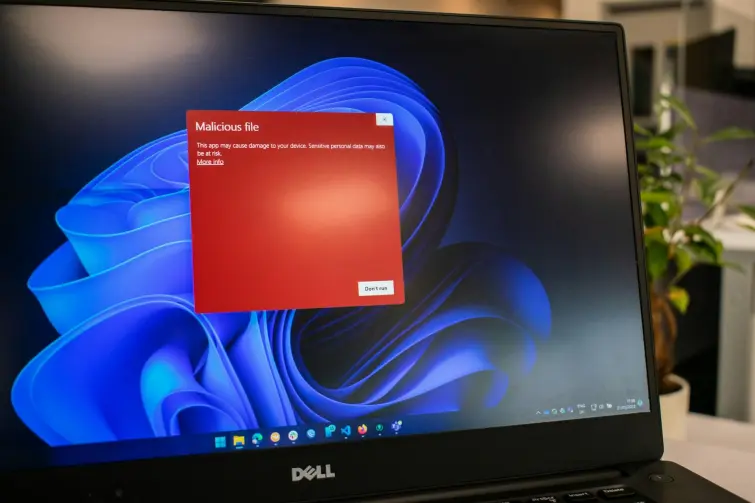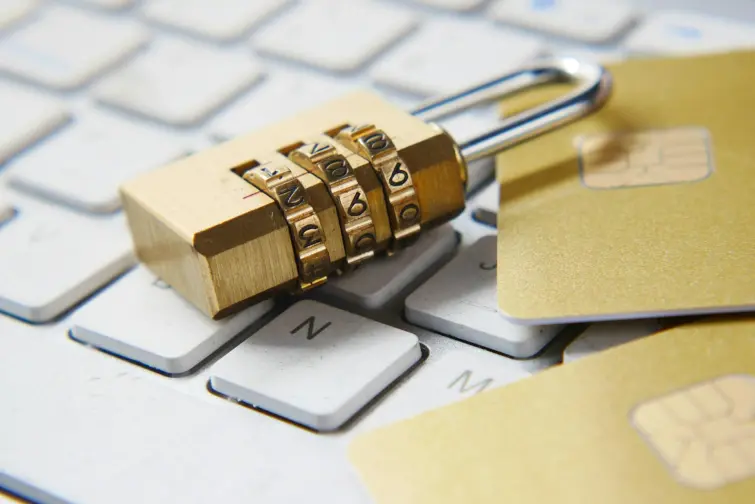If you're unsure whether you need a VPN or antivirus, we're here to help! Most security advocates would advise you to install both, however, this guide may help clarify if that's necessary in your particular case. ProPrivacy is all about tailored solutions, so let's explore your options together!
Virtual Private Networks (VPNs) and antiviruses play crucial roles in protecting your devices and data, however, they serve different purposes and function in distinct ways.
Understanding the differences between these two software types can help you make informed decisions about your cybersecurity needs. This article will explore what each tool does, how they differ, and how you might benefit from using both to safeguard your digital life.

What is an antivirus?
An antivirus is a specialized software program designed to detect, prevent, and eliminate malicious software, commonly referred to as malware, from computers and other electronic devices. There are many types of malware, such as viruses, worms, trojans, and spyware. An antivirus scans your device's files and programs to detect and eliminate malicious code to prevent data harvesting and any potential damage to the system.
As a crucial component of cybersecurity, a reliable antivirus provides a line of defense against a wide array of cyber threats, especially those mentioned above. Here’s a detailed analysis of antivirus software, exploring its mechanisms and uses.
What does an antivirus do?
An antivirus program is a crucial tool in the realm of cybersecurity, designed to protect your computer from malicious software and various other online threats. If you're not vigilant, you can inadvertently download malware by clicking on a malicious link or saving a harmful attachment, such as in a phishing email.
Once your computer is infected, a cybercriminal can execute intended malicious activities, including taking control of your device, spying on your activities, logging your keystrokes, stealing personal data, locking your system and demanding a ransom, or even wiping everything from your system. Using antivirus software can help mitigate these threats.
Here are the key functions of an antivirus program:
- Malware detection – Antivirus software is specialized for detecting signs of malicious software, including viruses, worms, trojans, ransomware, spyware, and adware. The software uses a database of known malware signatures to identify potential threats.
- Real-time protection – Most modern antivirus programs provide real-time protection, monitoring your system in the background and automatically detecting and blocking threats as they attempt to break into your system.
- System scanning – Antivirus software performs scheduled, on-demand scans of your entire system or specific files and folders. This provides an additional layer of protection by identifying and removing any malicious software missed by real-time protection.
- Threat removal – Upon detecting a threat, antivirus programs can quarantine the malicious files to prevent them from causing harm or spreading. Users can then review the quarantined items and decide which ones to delete and which to restore (if identified falsely).
- Heuristic analysis – Antivirus programs can even detect previously unknown threats by analyzing the unusual behavior of files and programs – called heuristic analysis. This allows them to identify and block new, emerging threats that are not yet named.
- Phishing protection – With this cyber threat continuously on the rise, many antivirus programs include features to protect against phishing. They can identify and block fraudulent software designed to steal data or solicit money from the victims.
- Firewall integration – Some antivirus solutions come with built-in firewalls or integrate with existing firewalls to provide enhanced network security. This helps monitor and control incoming and outgoing network traffic, blocking potential threats before they reach the device.

Advanced antivirus features
On top of the essential functionalities, renowned antiviruses nowadays keep upgrading their service with the following advanced features and more:
- Ransomware protection – Some antivirus software can detect and block ransomware activities intended to encrypt a user's files and demand money (ransom). They do it by monitoring file access patterns and preventing unauthorized encryption.
- Email and web protection – Antivirus software often extends its protection to email clients and web browsers. Antivirus software can scan emails to detect and block malicious attachments and links, preventing malware from spreading through this and similar channels of communication.
- Identity theft protection – Advanced antivirus programs can even include features to monitor and protect against identity theft. They can alert you to suspicious activities involving your personal information, helping to prevent unauthorized use of your identity.
- Parental controls – Advanced antivirus programs may include parental control features, allowing parents to monitor and restrict their children's online activities. This helps protect minors from inappropriate content and cyber threats.
- Performance optimization – Additionally, many antivirus programs include tools for tailoring system performance to your liking. They can clean up unnecessary files, manage startup programs, improve overall system efficiency, etc.
What is a VPN: Detailed analysis
A Virtual Private Network (VPN) is a great security tool with a long list of practical applications. It secures your activities online by creating an encrypted tunnel through which all your internet traffic goes. By encrypting and routing your data through this secure tunnel, a VPN basically hides it from hackers and other cybercriminals, but also from your government and ISP that have a habit of monitoring you.
Additionally, a VPN assigns you a new IP address, making your online activities more anonymous and allowing you to appear as if you were browsing from a completely different location – the one of the server you're connected to. This VPN feature not only provides valuable privacy protection but comes with plenty of practical uses too. For example, you get to bypass censorship and unblock most geo-restricted services online, including gaming and streaming platforms, and more.
Although it may sound complicated, VPNs are actually super easy to use, even if you have no experience with security software whatsoever. All you need to do is subscribe to a VPN service provider and download the VPN app or software provided. After installing it on your device, open the VPN application, log in with your credentials, and select a server location to connect to. Once connected, your online activities get securely routed through a VPN tunnel, with your IP address masked, providing not only enhanced privacy and security but also more freedom and opportunities online.
What does a VPN do? The best VPN usages
While an antivirus mostly keeps your devices safe from different types of malware, a VPN has many usages. I listed the most important ones below. I also provided examples to make our non-tech-savvy readers understand them better.
Enhancing online privacy and security
As mentioned earlier, the most important VPN characteristic is that enhances your online privacy and security by encrypting your online traffic and hiding your real IP address. This way, it protects your sensitive data from various online spies, especially on unsecured networks like public Wi-Fi.
- Example: You're in a rush, so you're using a less secure public Wi-Fi at a coffee shop for an important money transfer. However, you have a VPN on, so your transaction gets encrypted and your online identity protected. Thanks to a VPN, your passwords and banking information remain secure from potential malicious actors.
Bypassing geographic restrictions
On top of keeping you safe online, a VPN allows you to access content that's blocked in your current location by making it appear as if you are browsing from a different place.
- Example 1: A UK user in the United States wants to watch a TV show available only on their home country's Netflix catalog. By connecting to a VPN server in the UK, they can bypass the geo-blockade and access the show as if they were still in the country.
- Example 2: A student studying abroad wants to access a research database available only to users in their home country. By connecting to a VPN server in their own or nearby city, the student gets to access the database without restrictions.
Avoiding censorship
A VPN enables access to unavailable websites, apps, and various online services in countries with strict regimes by connecting through servers in countries with more internet freedom.
- Example: You are traveling to a country with strict internet censorship, like China. If you install a VPN suitable for China beforehand, you'll be able to continue enjoying banned services like Google, Facebook, and Twitter once you're in the country. All you need to do is connect to a server in a country with free access to those platforms.
Protecting anonymity
By masking your IP address and encrypting your internet traffic, a VPN helps protect your anonymity online (to an extent), making it difficult for snoopers to track your activities.
- Example: A journalist working on a sensitive story under a pseudonym can use a VPN to hide their IP address and encrypt their communications, further protecting their identity and making it difficult for their adversaries to track their activities.
Safe remote access
VPNs also provide a secure connection for remote employees. They can access their company's internal network and resources no matter where they are as if they were physically in the office.
- Example: A remote worker uses a VPN to connect to the company’s internal network, securely accessing files and applications with encrypted data transmission.
Secure online banking
Using a VPN ensures your online banking activities are protected, especially when accessing your accounts from unfamiliar or insecure networks.
- Example: You're abroad and unable to use your banking app for safety reasons. Using a VPN to connect to a server in your home country will enable you to securely access your online banking account. So you'll be able to bypass your banking app's geo-restrictions, while also avoiding potential foreign network risks.
Preventing bandwidth throttling
A VPN can help bypass bandwidth throttling imposed by some ISPs, providing a smoother and faster internet experience for data-intensive activities like streaming and downloading.
- Example: A user streaming in HD notices their internet speed has slowed down due to bandwidth throttling by their ISP. Using a VPN can solve this problem as it enables you to connect to a server in a different country and bypass your home network restrictions, providing a smoother streaming experience.

What’s the difference between an antivirus and a VPN?
Antivirus software and VPNs serve distinctly in cybersecurity, however, they complement each other very well. Antivirus software is designed to detect, prevent, and remove malicious software from infecting your device. It scans for and neutralizes threats like viruses, malware, and ransomware, ensuring your device and data remain secure from various cyber threats. In contrast, a VPN focuses on enhancing your online privacy and security by encrypting your internet connection and routing your traffic through a secure server.
Here's how antivirus and a VPN differ in more detail:
Purpose-wise distinction
Antivirus is designed to detect, prevent, and remove malicious software (viruses, malware, ransomware, etc.) from infecting your device. It scans files and programs for known patterns of malicious code, provides real-time protection against new threats, and helps keep your device and data safe from malware infections.
A VPN, on the other hand, aims to enhance your online privacy and security by encrypting your internet connection and routing your online traffic through a secure server operated by the VPN provider. It encrypts your data to prevent eavesdropping, hides your IP address to protect your identity and location, and allows you to bypass geographic restrictions and censorship.
Usage-wise distinction
Antivirus software is essential for safeguarding your device and data from a wide range of cyber threats, especially when browsing the internet, downloading files, or opening email attachments. It focuses on protecting your device from malware infections and ensuring that your system remains secure.
A VPN is particularly useful for protecting your online privacy and security, especially when accessing the internet on unsecured public Wi-Fi networks, bypassing geo-restrictions on content, and ensuring secure remote access to corporate networks. It focuses on encrypting your internet connection and ensuring that your online activities remain private and secure.
Additional benefits
On top of detecting and removing existing viruses, reliable antivirus software provides real-time protection, constantly monitoring your system for suspicious activities and potential threats that may emerge. Modern versions often include features such as firewalls, email scanning, and web protection to block malicious websites and prevent phishing attacks. Additionally, many antivirus programs offer system optimization tools that help improve your device's performance by removing unnecessary files and managing startup programs.
Besides encrypting your online traffic, a VPN allows you to maintain anonymity online by changing your IP address, which protects you from being tracked by websites, advertisers, and other third parties. It also enables hassle-free access to region-locked content – such as websites, and gaming and streaming services, otherwise unavailable in your location – by connecting to a server in a different country.
Moreover, some VPNs, like NordVPN and Surfshark, even offer malware, trackers, and ad protection as a complimentary service with their subscription plans. Of course, this protection is not as comprehensive as with an antivirus, whose primary specialty is to protect you from such dangers, but this can be a valuable asset – especially for users who can't afford to pay for both at the same time.
Which one should I use?
Ideally, all of us should use both antivirus software and a VPN for the ultimate protection against a variety of online threats. They complement each other by addressing different aspects of cybersecurity, ensuring that your devices and sensitive data are safeguarded from online risks. We appreciate, however, that not everyone needs or can afford both, so this is how you should choose:
- Antivirus software: If you're mostly concerned about protecting your device from malware, viruses, and other malicious software, then using antivirus software is your priority. A reliable antivirus will also provide valuable protection against modern-age cyber threats that can compromise your device and data.
- VPN: If you're concerned about your online privacy and security, especially on unsecured networks, or you need to securely bypass geo-restrictions, then a VPN is our recommendation. A good VPN encrypts your internet connection and changes your IP address to help you regain your online freedom and security.
What are the best antiviruses?
When choosing an antivirus program, it is essential to pick a reliable one with a good reputation, otherwise, it might do more harm than good. The good news is that you don't have to spend a fortune on effective protection. Many reliable antivirus programs come at reasonable prices, and some even come for free (basic plans).
- Norton 360 – The antivirus protection we recommend for most customers. It's the only antivirus that detected and prevented 100% of the threats in our tests.
- VIPRE Antivirus – An all-around antivirus with sleek, user-friendly apps for all OS and powerful malware protection.
- Intego – The best antivirus for Mac computers. Feature-rich and with an excellent (award-winning) reputation.
- F-Secure – Excellent antivirus service with phishing protection. It's not the cheapest antivirus on this list, but it provides superb real-time monitoring.
- AVG AntiVirus – An affordable and versatile antivirus that reliably catches exploits across all your devices.
What are the best VPNs
There are hundreds of active VPNs on the market and dozens that are worth your money. So, how to choose the best service provider for yourself? We have tested and compared VPNs daily for over 10 years now, so these are our top recommendations:
- ExpressVPN - The best VPN on the market. Consistently fast with a wealth of premium features. Offers a risk-free 30-day money-back guarantee.
- NordVPN - The best buy VPN. You get a versatile service with customizable plans to access a variety of websites and platforms worldwide seamlessly.
- Surfshark - The best multi-device VPN, offering unlimited simultaneous connections, advanced features, and servers across the globe, with a zero-logs policy.
- Private Internet Access - The most secure US-based VPN. It provides robust encryption, advanced VPN protocols, and a verified privacy policy.
- PrivateVPN - The VPN for beginners. Installs in the blink of an eye and is super-affordable, making it ideal for VPN newbies!
EXPLORE EXPRESSVPN: 30 DAYS RISK-FREE
ExpressVPN is extending a complete 30-day trial for those who register here . Delve into the best-in-class privacy VPN with zero restrictions for a month, ideal for those eager to use the best VPN.
Straightforward policies—get in touch within 30 days if you choose to opt-out and claim a full refund. Start your ExpressVPN trial now .
If this wasn't helpful enough, make sure you check our comprehensive VPN reviews. They deal with each of these, and other valued VPN providers, in much more detail.
What are some other great security tools?

If you are a security-oriented individual who is not considering whether to use an antivirus or a VPN but what other security/privacy tools to use on top of these two, this section is for you. Here are other leading security tools that will further enhance your experience online:
- Password managers – These security tools create, store, and manage passwords for your accounts. Generating strong, unique passwords is not always easy, not to mention remembering them. A good password manager does all this for you, saving you considerable effort and making your accounts even more secure.
- Two-factor authentication (2FA) software – 2FA apps add an extra layer of protection by requiring a second form of verification each time you try to access an important account, on top of your regular password. They significantly reduce the risk of breaches.
- Firewalls – Firewalls monitor and control incoming and outgoing network traffic based on predetermined variables, providing a barrier between your trusted internal network and untrusted external networks.
- Secure browsers – As opposed to some more popular browsers, such as Chrome, these browsers are designed with privacy in mind to protect your data and online privacy. Examples include Brave, Tor Browser, and Mozilla Firefox with privacy extensions.
- Backup solutions – Reliable backup solutions ensure your data is safely stored in an online cloud and can be recovered as needed. They prevent data loss that can happen due to security breaches or hardware failures.
- Anti-phishing tools – Apps and browser extensions that help identify and block phishing attempts to protect you from data harvesting and payment manipulations. Some antiviruses have anti-phishing tools included in their offer.
Using a combination of these tools, along with antivirus software and a VPN, can significantly enhance your overall security and protect you from a wide range of cyber threats.
Conclusion
Ensuring comprehensive cybersecurity requires a multi-faceted approach that combines various tools and strategies. Antivirus software and VPNs are foundational elements, each addressing distinct aspects of online protection: antivirus software guards against malware and cyber threats, while VPNs enhance privacy and secure internet connections.
Supplementing these with additional security tools, such as password managers, two-factor authentication apps, firewalls, anti-malware software, secure browsers, encryption tools, ad blockers, network monitoring tools, backup solutions, and anti-phishing tools can provide a robust defense against a wide array of online threats. By leveraging these tools, you can safeguard your personal data, maintain privacy, and ensure a secure and seamless online experience.
